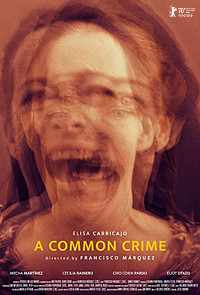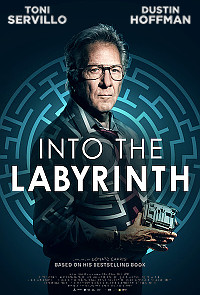| SHADOWS ON THE WALL | REVIEWS | NEWS | FESTIVAL | AWARDS | Q&A | ABOUT | TALKBACK | |||||||||||||||||||||||||||||
 Shadows off the beaten path Shadows off the beaten pathIndies, foreign, docs and shorts...
On this page:
A COMMON CRIME |
DEAR COMRADES! |
INTO THE LABYRINTH
| |||||||||||||||||||||||||||||
| See also: SHADOWS FILM FESTIVAL | Last update 18.Apr.21 | |||||||||||||||||||||||||||||
|
A Common Crime Un Crimen Común Review by Rich Cline | 
BERLIN FILM FEST  Is it streaming?
| 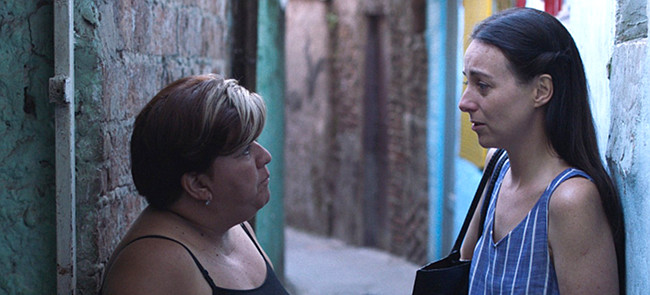 Shot with an eerie calmness, this understated Argentine drama quietly shifts into gnawing, internalised horror. This psychological approach makes the film gripping to watch, especially as the narrative is underlaid with resonant themes relating to social responsibility and police corruption, astutely filtered through class consciousness. The approach might be too low-key for genre fans, but filmmaker Francisco Marquez laces scenes with both nerve-jangling emotions and provocative ideas. Sociology professor Cecilia (Carricajo) has a relaxed life as a single mother, enjoying her spare time with her cheeky young son Juan (Pardo) and her maid Nebe (Martinez). Then one rainy night, she ignores Nebe's teen son Kevin (Otazo) as he bangs on the door, paralysed by fear. When the news breaks that he was murdered by police later that night, protests erupt in the streets, while Cecilia is tormented with her guilty secret. And when strange things begin happening around the house, she begins to believe that Kevin's ghost is haunting her. The film is shot in a claustrophobic Academy ratio, with most scenes playing out in oppressive silence, as Cecilia sneaks glances at each of the other characters, frightened of her own shadow. Aside from her jangling nerves, Cecilia is thoughtful and observant, and there's an everyday sensibility to the way she interacts with each person around her. But scenes are shot and edited to add increasing unease, allowing the audience to experience each event through Cecila's anxious eyes. And in a clever touch, people keep noticing that she has something in her eye. Performances are remarkably subtle, keeping the enormous emotions bottled inside. Carricajo is terrific at the centre as a methodical, intelligent woman whose suppressed feelings are causing her to unravel. Her face is a bundle of conflicting emotions, which we interpret differently from the other characters, especially Martinez's warm, understandably stunned Nebe. And because Cecilia refuses to share her pain, others treat her with almost banal normality, which skilfully tightens the screws. Marquez maintains a hushed tone throughout each sequence, leaving the plot in the background while shifting focus to what remains unspoken between the characters. And the camera rarely leaves Cecilia's face, even when she's interacting with others. All of this makes watching the film rather demanding, especially as many scenes move in achingly slow silence. While a rollercoaster scene is a little on-the-nose, more random touches add churning undercurrents that are devastating. And bigger ideas give the terror an unexpected weight.
|
| Dear Comrades! Review by Rich Cline |  MUST
MUST  SEE SEE
| 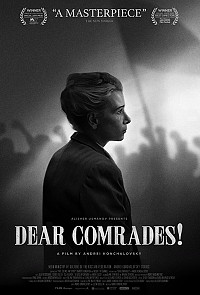 dir Andrei Konchalovsky scr Andrei Konchalovsky, Elena Kiseleva prd Alisher Usmanov, Andrei Konchalovsky with Julia Vysotskaya, Vladislav Komarov, Andrei Gusev, Yulia Burova, Sergei Erlish, Dimitriy Kostyaev, Goga Pipinashvili, Pyotr Olev, Vyacheslav Pigarev, Artyom Krisin, Yuri Grishin, Kseniya Komarova release Rus 12.Nov.20, UK 15.Jan.21, US 29.Jan.21 20/Russia 2h01 VENICE FILM FEST Is it streaming?
| 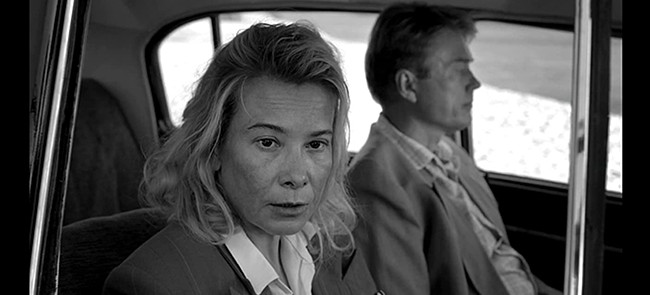 Shot in pristine black and white like a 1960s film, this Russian drama is infused with an electric sense of earthy realism. Expertly directed by Andrei Konchalovsky, this long-suppressed true story becomes a staggeringly clear-eyed depiction of life in the Cold War-era Soviet Union. All of which makes it viscerally involving as the narrative explores a pattern of political injustices that's shamefully recognisable today around the world. In the industrial town Novocherkassk in 1962, local council member Lyuda (Vysotskaya) is having an affair with her married boss Loginov (Komarov). She lives with her father (Erlish) and feisty teen daughter Svetka (Burova), and remains loyal to the Communist Party even as she's weary of food rationing and promises of a better future that never arrives. When the Soviet government raises prices, factory workers go on strike, then march in force to the council offices. The military responds with a bloodbath. Afterwards, Lyuda becomes desperate to find Svetka, who went missing in the chaos. Each sequence bristles with details of life in this place and time, while the story is populated with characters who interact in sparky ways that add powerful resonance to both intimate moments and expansive themes. The action flickers between various fronts, exploring the layers of control from party bosses to powerless workers. The way officials casually identify and persecute anyone who looks shifty is chilling. And these officials are also being squeezed from above, constantly seeking a back door through which they can make their escape. Vysotskaya delivers a storming performance as a woman full of attitudes and opinions, putting party over everything until it touches her personally. Her emotional moments are staggering. But her stubborn devotion to the Stalinist ideal is slowly eroded by this series of events, which spark her father to matter-of-factly recount nightmarish "unofficial" stories from his past. Indeed, Erlish is a standout in the ensemble, as are Komarov, Gusev (as a helpful KGB agent) and Kostyaev (as the panicky factory boss). Both elaborately staged crowd sequences and small dramatic moments are riveting, superbly shot and played for maximum impact, maintaining intensity with an accompanying wry sense of irony. The officials' main concern is that news of this incident doesn't get out, classifying the events as a state secret, arresting anyone who was there, even repaving the town square to get rid of the blood, then staging a huge party. The massacre wasn't confirmed or investigated until after the Soviet Union's collapse in 1991.
|
| Into the Labyrinth L’Uomo del Labirinto Review by Rich Cline | 
Is it streaming?
| 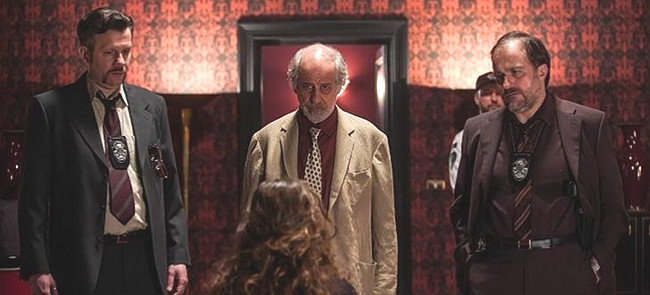 Italian author Donato Carrisi writes and directs his own adaptation of his horror mystery novel. With a noir-style script and stylised visuals, the film catches the interest from the start. It may be too over-the-top to sustain such a long running time, packed with indulgently ominous touches and scenes that feel superfluous. But it features an abundance of twists, turns and revelations, plus several mind-bending shifts in the narrative. Kidnapped 15 years ago and only just rescued, Samantha (Belle) is hospitalised while police psychiatrist Green (Hoffman) treats her. After being heavily drugged, all she remembers is that she was held in a labyrinth. As Green interviews her and teases out stories from her captivity, the fatally ill private investigator Bruno (Servillo) is braving a brutal heatwave, searching for clues about the kidnapper, determined to find answers even though Samantha's parents are now deceased. As he clashes with the police detectives (Cinque and Dini) working the case, Bruno makes a series of horrific discoveries. Relentlessly serious, the film's intense colours combine with arch camerawork and effects to create a supernatural comic-book sensibility that echoes a key plot element. Samantha's account takes the audience into the disoriented maze, as she must complete increasingly difficult challenges just to survive. Meanwhile, Bruno's investigation plays out in a nightmarish swirl of freaky encounters leading to a giant bunny-man with red heart-shaped eyes who was himself kidnapped as a child. And the script delights in pulling the rug out from under us. Performances match the film's heightened tone, adding unsettling details that complicate the characters. The terrific Servillo gives Bruno a wonderfully raspy charm. A man with nothing to lose, his unflappability is deeply engaging, and gives the film its heart. By contrast, Hoffman offers a dry, intriguing turn as he and a deliberately uneven Belle reveal the plot's secrets. They also get the only moments of naturalistic humour. Most of the side roles offer nutty twists that are often atmospherically exaggerated with makeup, costumes and shadowy sets. Ambitiously, Carrisi throws in some creepy Lynchian touches, reflecting Bruno's distinctive perceptions. Indeed, much of the movie makes little clear sense, including relationships between some characters. But each scene is mesmerising, taking us into a wide range of fascinating settings, from the lurid red home of Bruno's prostitute friend (Shulha) to a gothic church full of sinister clues. And while the plot keeps our minds spinning, it's Bruno's simple desire to forget about his mortality that makes the movie memorable.
| 
See also: SHADOWS FILM FESTIVAL © 2021 by Rich Cline, Shadows
on the Wall
HOME | REVIEWS | NEWS | FESTIVAL | AWARDS
| Q&A | ABOUT | TALKBACK | | |||||||||||||||||||
